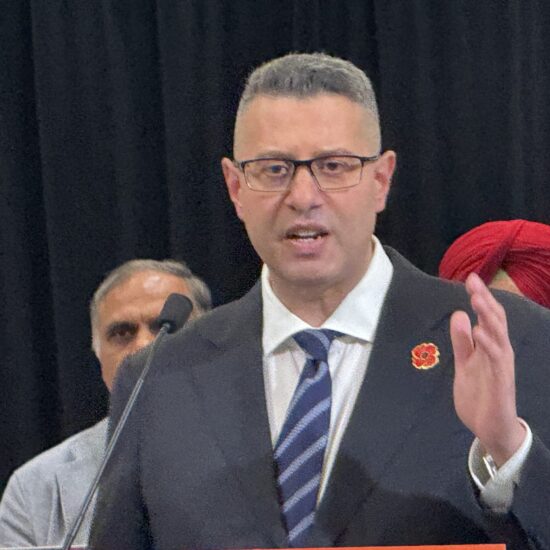
Bob Mackin
Who is behind the Vancouverites for Affordable Housing group on Facebook?
Who made the anonymous ads targeting Vision Vancouver and independent candidate for mayor Kennedy Stewart?
The operator has not responded to theBreaker and Facebook refused to disclose the name of whoever is using the variation of mayoral candidate Hector Bremner’s “let’s fix housing” slogan.
Likewise, Bremner did not respond to theBreaker.

Logo for anonymous Vancouver election-related Facebook page
The Facebook group is already drawing the ire of some concerned citizens.
“Who is behind this group please?” wrote Elvira Lount. “What exactly is your solution for affordable housing? You just don’t start a page without any explanation! And one of your first posts is an anti-union one against Kennedy Stewart. Fake site perhaps? Report to Facebook everyone.”
Added Peter Nicholas Pallett: “Since you don’t identify what candidate/party/special interest group this page is aligned with you’re pretty much chickenshits with zero credibility.”
A Facebook public relations representative, who did not want his name published, referred theBreaker to Elections BC. The agency’s Andrew Watson, however, said there is nothing that can be done for now.
The section of the Local Elections Campaign Financing Act that requires political advertising to contain identification of the advertiser is not in effect until the local elections campaign period runs from Sept. 22 until the Oct. 20 election day. Even then, it will not cover all types of election advertising.
“During the campaign period, third party election advertisers must register with our office and include their name and contact information on all advertising,” said Watson. “Free social media posts and pages are not subject to these rules, though paid ads are.”
The Facebook representative said Facebook is not introducing any B.C.-specific security measures for the Oct. 20 municipal elections. The company is focusing on the Quebec and New Brunswick provincial elections, instead. On Aug. 21, Facebook’s head of public policy for Canada, Kevin Chan, held a conference call with reporters about those provincial elections.
According to his speaking notes, Chan told reporters that Facebook used a report by the Communications Security Establishment as a basis for several new measures, because the report warned that account hacking and misinformation were the biggest potential cyberthreats to the 2019 federal election.
Last fall, Canada was Facebook’s first market for a new function to identify advertising content as such, but there is no requirement yet for the advertiser’s identity to be visible to the reader. Facebook is, however, rolling out identification of those behind political advertising in the U.S., where advertisers must provide the company with government issued photo identification and verify where they live in the U.S.
“We believe people should be able to easily understand why they’re seeing ads, who paid for them, and what other ads that advertiser is running,” said Chan’s notes.
In June, it launched a third-party fact checking by Agence France-Presse. Chan claims there are 20,000 people reviewing reports of bad content and bad actors around the clock, in 50 languages.
“You can never fully ‘solve’ a security problem,” Chan said. “Threat actors will constantly find new ways to cause harm; but our goal is to make it much, much harder for these actors to operate across our platforms.”
The company also released a new “cyber hygiene” guide and training program for Canadian political parties and candidates, and it opened a cyber security hotline for political parties.
theBreaker asked the Facebook representative Aug. 22 for an interview with Chan, about B.C.’s upcoming municipal elections. The representative said that Chan was not available, because of parental leave.
The same CSE report that Facebook cited said municipal elections are “likely to come under increasing threat from nation-states and hacktivists.”
“In particular, we know that certain nation-states have core interests that can be affected by Canadian policies related to natural resources, which are often made at the provincial/territorial level. In addition, Canada has provincial/territorial and municipal leaders that have made policies and statements garnering national and international attention. Hacktivists may begin to view sub-national elections, political parties and politicians, and the media as worthy targets.”
In June 2010, Canadian Security Intelligence Service head Richard Fadden told CBC that municipal politicians in B.C. were under the influence of a foreign government. He did not name the country, but strongly hinted that it was China.
A CSIS report from May 2018 said China’s “dominance strategy appears relentless and irresistible,” noting its aggressive diplomacy and insistence on asymmetrical trade.

What does Hector Bremner know about the anonymous Facebook page?
Research for the U.S.-China Economic and Security Review Commission, released Aug. 24, said the Chinese Communist Party’s United Front Work Department “seeks to co-opt ethnic Chinese individuals and communities living outside China while a number of other key affiliated organizations guided by China’s broader United Front strategy conduct influence operations targeting foreign actors and states.”
The report cited the work of author Clive Hamilton, a public ethics professor at Charles Sturt University in New South Wales.
“United Front organizations groom members to participate in politics in target countries, both as candidates for election and as staff in important positions,” said the report. “The Australian Security Intelligence Organization has reportedly estimated at least 10 recent Australian state and local government political candidates are connected to Chinese intelligence agencies. United Front activities in Australia have involved political donations, influence operations targeting high-ranking politicians, and harassment of members of the Chinese-Australian community.”
A federal committee report in June, probing the involvement of Victoria-based AggregateIQ in the Facebook/Cambridge Analytica scandal, recommended that the Government of Canada “urgently act” to subject political activities to privacy laws, as they are already in British Columbia. The Office of the Information and Privacy Commissioner began an investigation last September, after complaints arising from the 2017 provincial election. The scope of that investigation was expanded when whistleblower Christopher Wylie made international headlines in March about Cambridge Analytica and AggregateIQ activities in the U.K. and U.S.
“The scandal has brought to light issues relating to mass data harvesting, the use of data for nefarious purposes, and the threats and challenges these questionable methods can create for democracies around the world,” said the report by the Access to Information, Privacy and Ethics Committee. “The evidence that the committee has heard so far gives rise to grave concerns that the Canadian democratic and electoral process is similarly vulnerable to improper acquisition and manipulation of personal data.”
Support theBreaker.news for as low as $2 a month on Patreon. Find out how. Click here.











